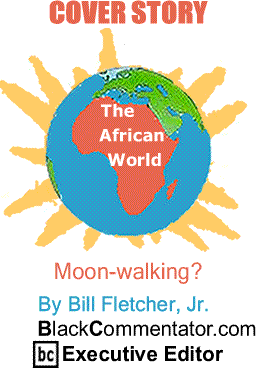
|
||||||||||||||||||||||||

|
|

Custom Search
|
|
 |
|
July 20, 1969 I was in Hyannis, Massachusetts. I was watching all the coverage of the moon landing and was positively thrilled. Yes, I was aware, as the Black Panther Party warned at the time, that this moon landing could be the harbinger of an expansion of imperialism into outer space, but I saw in the landing immense possibilities for the future of human-kind. I still do.
In addition to various inventions that have been introduced as a direct result of space travel and exploration, the fundamental reason to pursue space exploration is because it is “there.” Arguments can abound as to the minerals that probably can be harvested from asteroid fields and other planets, but more than anything else, what lies in space is the answer to a question which has teased humanity since we turned our heads to the skies: are we alone? If one goes beyond the philosophical, however, there is a strong argument for a progressive, rather than military, expansion into space: the survival of human life on Earth. One reason, which has been ridiculed by some commentators, is the actual danger to planet Earth from asteroid or comet impact, e.g., the asteroid that hit Earth and exterminated the dinosaurs 65 million years ago. Thus, having human outposts on other planets increases the chances for human survival. The second reason is actually related to the first - that as fascinating as is space, it is also quite dangerous. There may be protective measures that humans can take against asteroids or meteors if we develop the appropriate technology, e.g., an early warning system and sufficient space travel capability. Third, and to borrow from the progressive science fiction writer Kim Stanley Robinson and his commentary in the July 19, 2009 issue of the Washington Post, there may be means to tap into the Sun for energy that can be transmitted to Earth to address the increasing demands of the population of the planet.
A friend of mine once scoffed at my suggestions about human expansion into space by arguing that humans have made such a mess of the Earth, why would we not do the same thing in outer space? Despite the mockery I took this comment quite seriously. Yet the answer depends on whether one believes that humans have a built-in predilection toward destruction or whether the destruction of the blue planet is tied into socio-economic systems that have placed wealth and avarice above the collective good for human-kind. Additionally, the answer to this question depends on whether one believes that the question of space is actually the sort of challenge that humanity needs in order to survive. Specifically, is an expansion into space part of a humbling process that at one and the same time reminds us of our relative insignificance on the scale of the universe, but also reminds us of the interconnections between all things?
BlackCommentator.com
Executive Editor, Bill Fletcher, Jr., is a Senior Scholar with the
Institute for Policy Studies,
the immediate past president of TransAfrica Forum and co-author of, Solidarity Divided: The Crisis in Organized Labor and a New Path
toward Social Justice |
|
Any BlackCommentator.com article may be re-printed so long as it is re-printed in its entirety and full credit given to the author and www.BlackCommentator.com. If the re-print is on the Internet we additionally request a link back to the original piece on our Website. Your comments are always welcome. eMail re-print notice
If you send us an eMail message we may publish all or part of it, unless you tell us it is not for publication. You may also request that we withhold your name. Thank you very much for your readership. |
|
| |
|
| July
23, 2009 Issue 334 |
|
| Executive Editor: Bill Fletcher, Jr. |
| Managing Editor: Nancy Littlefield |
| Publisher: Peter Gamble |
| Est. April 5, 2002 |
Printer Friendly Version
in resizeable plain
text format or pdf
format. |
 |

|
 |
 |
 |
| |
| |







































